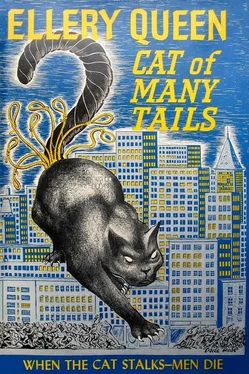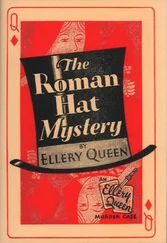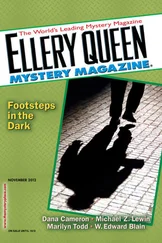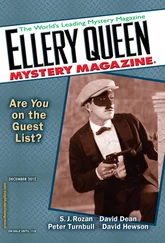“You what? We don’t know a thing about the Cat. The Cat may be male, female, 16, 60, white, black, brown, or purple.”
“I thought you told me a few days ago that you’d spotted something. What was it, a mirage?”
“Irony really isn’t your long suit, Dad. I didn’t mean something about the Cat himself.”
The Inspector shrugged. He started for the door.
“I meant something about the Cat’s operations.”
The old man pulled up, turned around.
“What did you say?”
“The six murders have certain elements in common.”
“Elements in common?”
Ellery nodded.
“How many?” The Inspector sounded choked.
“At least three. I can think of a fourth, too.”
His father ran back. “What, son? What are they?”
But Ellery did not answer.
After a moment the Inspector hitched his trousers up and, very pale, marched out of the room.
“Dad?”
“What?” His angry voice shot in from the foyer.
“I need more time.”
“For what? So he can wring a few more necks?”
“That was below the belt. You ought to know these things can’t be rushed sometimes.”
Ellery sprang to his feet. And he was pale, too. “Dad, they mean something. They must! But what?”
Ellery was nervy that weekend. For hours he occupied himself with compass, ruler, pencil, graph paper. Plotting the curves of statistical mysteries. Finally he hurled his co-ordinates into the fireplace and sent them up in smoke. Inspector Queen, coming upon him that broiling Sunday apparently warming himself at a fire, made the feeble remark that if he had to live in purgatory he was going to do something about lowering the temperature.
Ellery laughed disagreeably. “There are no fans in hell.”
And he went into his study and made a point of closing the door.
But his father followed.
“Son.”
Ellery was standing at his desk. Glaring down at the case. He had not shaved for three days; under the rank stubble his skin was green and mortal.
Looks more like a vegetable gone to seed than a man, thought his father. And he said again, “Son.”
“Dad, I’d better give up.”
The Inspector chuckled. “You know you won’t. Feel like talking?”
“If you can suggest a cheerful topic of conversation.”
The Inspector turned on the fan. “Well, there’s always the weather. By the way, heard from your — what did you call those two — Irregulars?”
Ellery shook his head.
“How about a walk in the Park? Or a bus ride?”
“Nothing new?” muttered Ellery.
“Don’t bother shaving. You won’t meet anybody you know; the City’s half-empty. What do you say, son?”
“That’s another thing.” Ellery looked out. There was a crimson hem on the sky. It brushed the buildings. “This damned weekend.”
“Now look,” said his father. “The Cat’s operated strictly on working days. No Saturday, no Sunday, and he bypassed the only holiday since he got going, Fourth of July. So we don’t have to get the jitters about the Labor Day weekend.”
“You know what New York’s like on Labor Day night.” The buildings bloodied. Twenty-four hours from now, he thought. “Bottlenecks at every road, bridge, tunnel, terminal. Everybody cramming back into town at the same time.”
“Come on, Ellery! Let’s take in a movie. Or, I’ll tell you what. We’ll rustle up a revue. I wouldn’t mind seeing a leg show tonight.”
Ellery failed to smile. “I’d only take the Cat with me. You go on and enjoy yourself, Dad. I’d be no fun at all.”
The Inspector, a sensible man, went.
But he did not go to a leg show.
With the assistance of a busman, he went downtown to Police Headquarters instead.
The dark turned cherry-colored in the heat as the French blades swished toward his neck. He held himself ready. He was calm, even happy. The tumbril below was jammed with cats knitting solemnly with silk cords of blue and salmon-pink and nodding their approval. A small cat, no larger than an ant, sat just under his nose looking up at him. This cat had black eyes. As he all but felt the flick of the knife and the clean and total pain across his neck it seemed to him the night lifted and a great light flew over everything.
Ellery opened his eyes.
His cheek throbbed where something on the desk had corrupted it and he was wondering that the screeching agony of the dream persisted past its borders when it occurred to him that the telephone in his father’s bedroom was ringing in a nasty monotone.
He got up and went into the bedroom and turned on the light.
1:45.
“Hello.” His neck ached.
“Ellery.” The Inspector’s voice stung him awake. “I’ve been ringing for ten minutes.”
“I fell asleep at my desk. What’s up, Dad? Where are you?”
“Where would I be on this line? I’ve been hanging around all evening. Still dressed?”
“Yes.”
“Meet me right away at the Park-Lester apartment house. It’s on East 84th between Fifth and Madison.”
1:45 A.M. It is therefore Labor Day. The 25th of August to the 5th of September. Eleven days. Eleven is one more than ten. Between Phillips, Simone, and Willikins, Beatrice, it was ten days. One more than ten makes...
“Ellery, you there?”
“Who is it?” His head ached abominably.
“Ever hear of Dr. Edward Cazalis?”
“Cazalis?”
“Never mind—”
“The psychiatrist?”
“Yes.”
“Impossible!”
You crept along the catwalk of a rationale while the night split into a billion tinsel fragments.
“What did you say, Ellery?”
He felt hung up in far space. Lost.
“It couldn’t be Dr. Cazalis.” He mustered his forces.
The Inspector’s voice said craftily, “Now what would make you say a thing like that, son?”
“Because of his age. Cazalis can’t be the seventh victim. It’s out of the question. There’s a mistake somewhere.”
“Age?” The old man floundered. “What the devil has Cazalis’s age got to do with anything?”
“He must be in his mid-60s. It can’t be Cazalis. It’s not in the scheme.”
“What scheme?” His father was shouting.
“It’s not Dr. Cazalis, is it? If it’s Dr. Cazalis...”
“It just happens it isn’t!”
Ellery sighed.
“It’s Cazalis’s wife’s niece,” said the Inspector peevishly. “She’s Lenore Richardson. The Park-Lester is where the Richardsons live. The girl, her father and mother.”
“Do you know how old she was?”
“Late or middle 20s, I think.”
“Not married?”
“I don’t think so. I have very little information. I’ve got to hang up now, Ellery. Get a move on.”
“I’ll be right there.”
“Wait. How do you know Cazalis wasn’t—?”
Just across the Park, Ellery was thinking, staring at the phone on the cradle. He had already forgotten having put it there.
The phone book.
He ran back to the study, grabbed the Manhattan directory.
Richardson.
Richardson Lenore 12 ½ E. 84.
There was also a Richardson Zachary 12 ½ E. 84 listed at the same number.
Ellery went about shaving and changing his clothes in a blissful nirvana.
Later, it was possible to synthesize his nightlong impressions into one complex. The night itself was a jumble. Faces flowed and crossed and hung apart; fragments of things said, voices broken, tears shed, looks passed, men coming, telephones ringing, pencils writing; doors, a chaise, a photograph, photographers, measurements, sketches, a small bluish fist, the dangle of a silk cord, a gold Louis XVI clock on an Italian marble fireplace, an oils nude, a torn book jacket...
Читать дальше












